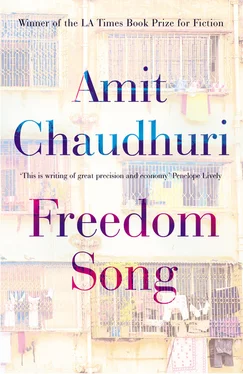He had been sitting there, alone, a faded red pullover pulled casually over a woollen vest. He happened to turn his head and was taken by surprise to see his own younger sister standing there and said:
‘Khuku?’
The room was narrow. To see the familiar and the living in a moment of inattention is sometimes as extraordinary as seeing the dead; or perhaps that was only true of Borda. He stared at Khuku in astonishment.
At Borda’s question, Boudi came out of the kitchen. Borda often spoke nonsense these days and she had to check if he was babbling nonsense again.
Although she was only four years older than Khuku, she looked several years older, partly because Khuku looked much younger than her real age, and partly because Boudi herself had aged prematurely. But the strange thing was that over the last ten years she had remained the same; it was as if she could age no more.
‘Khuku, Khuku,’ said Borda.
‘Look who I’ve brought with me,’ she said tolerantly.
‘Who’s that — is that Mini?’ asked Boudi.
When they were going back down Southern Avenue, the trees bare, children playing football and smoke rising at the back, she looked twice at Mini and saw that she was unmindful.
‘When do you think it’ll end?’ asked Mini, her jaw jutting out slightly. For the signs of upheaval were still there, the daily killings, for here was a billboard coming up proclaiming Hindu and Muslim amity.
‘You mean. .’
‘I mean you’ll never be able to appease them,’ said Mini.
What if one mosque had gone — for hundreds of temples had been destroyed before. She could not understand what the fuss was about.
By the lakes, the trees with outspread branches were bare. A few boys were playing football; further away, someone had lit a fire and a funnel of smoke was rising from it.
Promises, always promises. No sooner had the mosque gone down than the government had promised that it would be built again.
‘Who’ll rebuild those temples?’ she asked.
‘That’s right,’ said Khuku. ‘No one talks about them.’
They turned left into Gariahat.
Each day the azaan rose in the morning. Over the alley-ways it rose, and the tram-lines, spreading for a radius of over a mile.
This winter had not been a particularly cold one; it had been diffuse and gentle and chilly rather than crystalline in the mornings.
Meanwhile, the muezzin went on praising the virtues of Allah in syllables that sounded like ‘laillallah rasulallah’, and Allah was great, Allah was good and glorious.
The government did one thing today and another tomorrow. Today they said they would rebuild the mosque, and the next day they failed to honour the statement.
Some people thought they’d been too tolerant in the past.
Some people thought that the whole conception their country had been based on was flawed; so they must start again. Speeches were expended on the ‘idea’ of the country and what the meaning of that idea was.
The word ‘fundamentalism’, travelling everywhere and belonging nowhere: people tried to understand what it meant.
They appealed for the razed site to be left as it was, as a memorial to an event. Let the rubble stand.
In one newspaper, a Muslim writer said, ‘The heart of the parrot of Hindu fundamentalism beats in the giant of Muslim fundamentalism. Kill the giant, and you will have killed the parrot.’
At half-past ten, a lemon-coloured Ambassador arrived to pick up Khuku’s husband. This was a government car. It waited downstairs as Shib wore his trousers and shoes and wound a tie around his collar.
This lemon-coloured car might thus be considered one of the ‘perks’ of working at Little’s. It had a young longhaired driver at the wheel who talked indefatigably and had grown rather fond of Shib, and who took him to the office each day and brought him back. He was, naturally, one of those who’d lose his job if Little’s ever ceased to exist, as there seemed every possibility it might; the driver, however, appeared untouched by this possibility, which was more remote to him than his fantasies. ‘What was it like in Bombay, sir?’ he’d ask; for he was endlessly curious about Bombay. Last week Shib had been to the Writers’ Building, to the third floor, where the department that dealt with ‘sick’ companies was. The department had a resonant name: Industrial Reconstruction Department. Around it the inexhaustible, murmurous business of governance continued. Under its purview fell a number of companies, although the larger firms which were once impressive but now a liability, prehistoric dinosaurs that were in a museum that was constantly being added to, like Indian Iron and Steel and Bengal Potteries, had been bought over by the Central Government; their lives were governed from Delhi; they were maintained like tamed and exotic pets. Infrequently a sincere effort was made to have them privatized and release them from the imprisonment of an artificial existence into a normal life; but immediately the local trade union resisted the move as a betrayal that might cost employees their jobs. The state government took over smaller companies; it watched and waited; and when a company had ceased performing indefinitely it bought its shares, as it had bought Little’s.
Mr Seal of the department had been instrumental in employing Shib, indeed tempting him to employment. ‘We’ll see if it can be done, sir,’ he had said six months ago. He was referring to the task — not always mentioned — of reviving the company. ‘If anyone can, you can.’ He had wiped his forehead and Shib had sympathized with him inwardly. ‘If it can’t be done, we’ll let it go.’ ‘How can you just let it go?’ said Shib. ‘That is what I was coming to,’ said Mr Seal. ‘Because we don’t want to take a “negative attitude” at the outset.’
However, after the meeting last week — if one could call that conversation in the warmth of a late January morning across a stack of files a meeting — it had begun to become clearer to Shib that Seal could not back up his words. Perhaps Seal was beholden to someone else; there was always someone invisible in the background who tied your hands down; at any rate, there was always someone to pass the buck on to; Mr Seal seemed reluctant now, and a commitment could be drawn out of him only with great persuasion. But he would not let Shib go; ‘Mr Purakayastha, be patient with us,’ he said; it was as if he were waiting for an intervention to set things right.
For now what he had suspected all along became apparent to Shib, that there had been no change of heart, that the government would rather pay the salaries of the employees of Little’s until they ran out of spare money than allow the company to stand on its own feet, for which of course funds were necessary. And as for Seal and himself, they were divided by a common language; they spoke reasonably enough with each other, but seemingly without any intention of arriving at an understanding. It was the sort of dialogue he’d never taken part in in all his working life.
Later, these meetings depressed him; left him a little tired. He waited outside the Writers’ Building for the longhaired driver to spot him and pick him up.
In Little’s history, in fact, the history of Calcutta could be seen to have been written. First the company created by the Englishman of the same name eighty-five years ago; then the buying over of the company by an enterprising Bengali businessman of the name of Poddar; then the death of Poddar after Independence; quarrels and disputes between his sons; the company gradually going to seed; the take-over of the company by the state government in 1974; and what it was now, something that had a kind of life and breath, an existence, but not a real one.
Читать дальше












